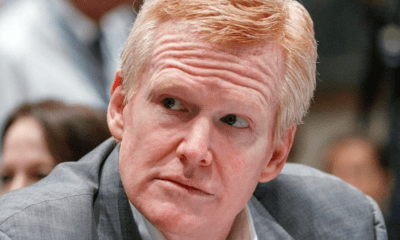NEWS
20 Reasons Retirees Are Disappointed When They Reach High Net Worth
Published
3 months agoon
Reaching a high net worth is often seen as the ultimate financial goal, especially for retirees. However, many discover that wealth doesn’t always bring the happiness or satisfaction they anticipated. From emotional challenges to unfulfilled expectations, being financially secure in retirement can still leave some feeling disappointed. Here are 20 reasons why high-net-worth retirees may struggle to find contentment and how they can overcome these challenges.
The Fear of Outliving Their Wealth

Shutterstock
Even with a high net worth, retirees often worry about running out of money due to unexpected expenses or longer-than-expected lifespans. This fear can lead to overly cautious spending, reducing their ability to enjoy retirement. Creating a solid financial plan with the help of an advisor can alleviate this concern. Peace of mind comes from preparation.
Unmet Lifestyle Expectations

Shutterstock
Many retirees envision a luxurious retirement but find that even with wealth, reality doesn’t match their dreams. High costs of travel, healthcare, and other expenses may limit what they can do. Managing expectations and focusing on meaningful experiences can help retirees feel more fulfilled. Wealth doesn’t always guarantee extravagance.
Strained Family Dynamics

Shutterstock
Wealth can create tension within families, especially when it comes to inheritance or financial support. Disagreements over money can strain relationships, making retirement less enjoyable. Open communication and clear estate planning can help avoid these conflicts. Healthy family relationships matter more than money.
Lack of Purpose

Shutterstock
After decades of working toward financial success, some retirees feel aimless once they achieve their goals. Without a sense of purpose, even a high net worth can feel empty. Engaging in hobbies, volunteering, or mentoring provides meaning and fulfillment. Purpose adds value beyond dollars.
Constant Financial Responsibilities

Shutterstock
Managing significant wealth involves ongoing financial decisions, from investments to taxes and charitable giving. These responsibilities can feel overwhelming, even in retirement. Delegating tasks to trusted advisors can help retirees focus on enjoying their wealth. Simplifying finances creates space for relaxation.
The Pressure to Leave a Legacy

Shutterstock
Many high-net-worth retirees feel obligated to leave a significant inheritance or make impactful charitable contributions. This pressure can overshadow their own retirement enjoyment. Balancing personal needs with legacy planning ensures retirees can live comfortably while still making a difference. Finding this balance reduces stress.
Feelings of Isolation

Shutterstock
Wealth can create barriers in relationships, making some retirees feel disconnected from friends or community. People may treat them differently or assume they can’t relate to common struggles. Finding a supportive network of like-minded individuals helps alleviate this loneliness. Strong connections are invaluable in retirement.
Unforeseen Health Costs

Shutterstock
Even with substantial savings, high healthcare costs can quickly drain retirement funds. From long-term care to unexpected medical emergencies, these expenses can cause stress. Planning for healthcare with insurance or dedicated savings reduces financial surprises. Proactive measures ensure peace of mind.
Difficulty Adjusting to Retirement

Shutterstock
For many retirees, transitioning from a busy career to a slower pace can be challenging. This shift can lead to boredom or dissatisfaction, regardless of financial success. Finding new interests or staying engaged in part-time work or consulting eases the transition. Staying active mentally and physically is key.
The Burden of Managing Inheritance Expectations

Shutterstock
High-net-worth retirees often face pressure from family members about inheritances. Expectations can create stress and strain family dynamics. Clear communication and well-documented plans ensure fairness and reduce misunderstandings. Setting boundaries protects both wealth and relationships.
Increased Scrutiny from Others

Shutterstock
High-net-worth retirees often feel judged for their financial choices, whether it’s how they spend or donate their wealth. This scrutiny can come from family, friends, or even the community. The pressure to “do the right thing” can make them second-guess decisions. Managing these expectations requires confidence and clear priorities.
The Challenge of Staying Motivated

Shutterstock
For many retirees, achieving financial success can feel like reaching the finish line, leaving them unsure of what to strive for next. Without clear goals, life can feel stagnant despite their wealth. Setting new challenges or focusing on personal growth helps maintain motivation and excitement. Retirement should be a time of renewal, not restlessness.
Difficulty Spending on Themselves

Shutterstock
After years of saving and building wealth, some retirees struggle to shift into “spending mode.” This mindset can prevent them from enjoying the fruits of their labor. Learning to allocate funds for experiences and personal enjoyment is crucial for a fulfilling retirement. Balancing saving with spending creates a healthier outlook.
Unrealistic Expectations About Happiness

Shutterstock
Many retirees assume wealth will solve all their problems, but emotional well-being doesn’t automatically follow financial success. True happiness often depends on relationships, health, and purpose rather than money. Understanding this distinction can help retirees focus on what truly matters. Wealth is a tool, not a guarantee of joy.
The Complexity of Managing Wealth

Shutterstock
High-net-worth retirees often find that managing significant assets requires a surprising amount of time and effort. From investment strategies to tax planning, wealth can feel like a full-time job. Delegating these tasks to financial professionals can reduce stress. Simplifying finances allows retirees to focus on enjoying life.
Feeling Disconnected from Their Community

Shutterstock
Wealth can sometimes create a divide between retirees and their community. They may feel out of touch with others’ struggles or worry about being perceived as unrelatable. Actively participating in local events or giving back through volunteering bridges this gap. Connection fosters a sense of belonging and fulfillment.
The Stress of High Expectations

Shutterstock
High-net-worth retirees often feel pressure to maintain or exceed their financial status. This can lead to stress about making perfect investment decisions or preserving wealth for future generations. Accepting that perfection isn’t necessary helps ease this burden. A focus on stability rather than constant growth brings peace of mind.
Overwhelmed by Philanthropic Decisions

Shutterstock
Many wealthy retirees want to give back but feel overwhelmed by the number of causes and organizations seeking support. Deciding where and how much to give can be a daunting task. Working with philanthropic advisors or focusing on personal passions makes giving more meaningful and manageable. Purposeful giving brings greater satisfaction.
The Challenge of Staying Relevant

Shutterstock
After leaving the workforce, some high-net-worth retirees struggle with feeling irrelevant. They may miss the influence or recognition they once had in their careers. Staying engaged through mentorship, consulting, or community involvement helps retirees feel valued. Contributing their expertise brings a sense of purpose and pride.
Worry About Future Generations

Shutterstock
High-net-worth retirees often worry about how their wealth will affect their children or grandchildren. Concerns about entitlement or financial mismanagement can overshadow their enjoyment of retirement. Open communication and financial education for heirs ease these worries. Preparing future generations ensures a positive legacy.
Conclusion

Shutterstock
While reaching a high net worth is a significant accomplishment, it doesn’t automatically lead to happiness or fulfillment in retirement. Emotional challenges, financial pressures, and unmet expectations can dampen the experience. By addressing these issues proactively and focusing on purpose, relationships, and health, retirees can enjoy their wealth to the fullest. True contentment comes from balance, not just a bank account.
More From Local News X
-


NYPD Using Drones To Monitor Labor Day Weekend Gatherings, West…
-


Near the Robb Elementary School Shooting Memorial
-


Sick and Tired: The 17 Reasons Americans Are Fed Up…
-


16 Top-Tier Firearms Absolutely Worth Their Massive Price-Tag
-


20 Things You Can Do Now If You’re Desperate For…
-


Escaped Killer Slips Search Perimeter in Pennsylvania, Manhunt Expands South
-


Watch left side of screen. Kaboom vault blew on slauson…
-


25 Shocking Discoveries Made In The Last 25 Years
-


21 Things That Will Disappear Forever With The Boomer Generation
-


22 Common Health Mistakes That Could Ruin Your Retirement
-


Convicted Murderer Alex Murdaugh Loses Prison Phone Privileges After Speaking…
-


20 Signs You’re In Fantastic Shape After 50
